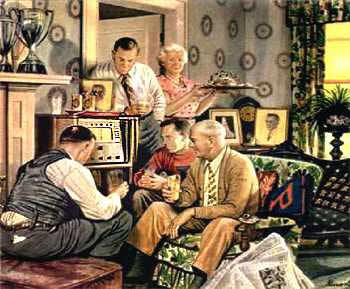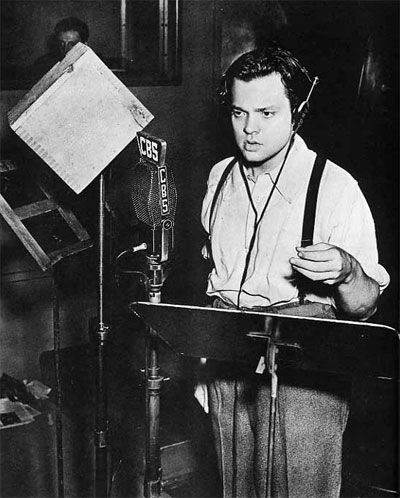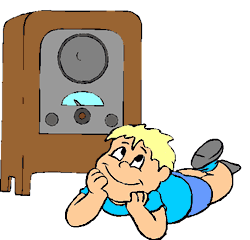Old Time Radio Had Radio Stars
Reliving Our Parents Memories Seventy Years Later
Personalities
Wikipedia carries a list of most of the personalities but I have my favorites and of course they would be the comedians.
Movie Stars Sans The Movie
 Top comedy talents surfed the airwaves for many years:
Top comedy talents surfed the airwaves for many years:
Fred Allen
,
Jack Benny
,
Victor Borge
,
Judy Canova
,
Jimmy Durante
,
Phil Harris
,
Bob Hope
,
Groucho Marx
,
Red Skelton
and
Ed Wynn
.
There were weekly radio shows just like on TV today. We would look forward to hearing the next episode.
More laughter was generated on such shows as:
Abbott and Costello
,
Amos 'n' Andy
,
Burns and Allen
,
Ethel and Albert
,
Fibber McGee and Molly
,
The Great Gildersleeve
,
The Halls of Ivy
, and
Meet Millie
..
Samples To Wet The Whistle!
- Flash Gordon On The Planet Mongo 1935 - This is serious stuff. Will he escape? With Dale be OK?
- Bob Hope and Al Jolson 1947 - What will Bob be talking about today?
- Father Knows Best and the Family Picnic 1950 - Who will bring the ants?
- The Shadow, Murger By A Corpse 1937 - Who done it?
- The Day The Sun Exploded
War Of The Worlds
 No history of radio would be complete without mentioning the famous (some would say "infamous") "War of the Worlds" broadcast in October, 1938.
No history of radio would be complete without mentioning the famous (some would say "infamous") "War of the Worlds" broadcast in October, 1938.
Orson Welles was a young, controversial genius of radio, stage and film. You may remember from an earlier module that he wrote, directed, and starred in Citizen Cane, considered by many to be this country's most notable film.
Among the many things he was involved in was a weekly network radio show called The Mercury Theater on the Air, which normally ran a distant second in the ratings against the "Charlie McCarthy" show on another network.
The Mercury Theater On The Air
 The finest radio drama of the 1930’s was
The Mercury Theatre
on the Air, a show featuring the acclaimed New York drama company founded by Orson Welles and John Houseman.
The finest radio drama of the 1930’s was
The Mercury Theatre
on the Air, a show featuring the acclaimed New York drama company founded by Orson Welles and John Houseman.
In its brief run, it featured an impressive array of talents, including Agnes Moorehead, Bernard Herrmann, and George Coulouris.
The show is famous for its notorious
War of the Worlds
(25 MB) broadcast which scard the dickens out of a load of people!
Where On The Web?
Radio Lovers
offers hundreds of vintage radio shows for you to listen to online in mp3 format, all forfree.
Before the days of video games, shopping malls, MTV, and the Internet, families used to sit in their living room each night to listen to radio shows.
They would listen to shows such as Superman, Groucho Marx, The Avenger, Gunsmoke, Sherlock Homes, and many others. When TV become popular in the 1950's, most of these shows went off the air, but they now live on at websites such as this one and on weekly nostalgia radio broadcasts worldwide.
Imagination Is Missing!
Today's listeners (my grandchildren), who use radio largely as a background to do other things, might wonder how radio could hold a listener's interest for several hours at a time.

There's a one-word answer: imagination.
Not being "troubled" by the spelled out details in pictures, the people of the era could and did imagine what the people and situations looked like.
For this reason radio was personally involving.
Birth Of The FCC
Scores of people were building their own personal radio stations, probably motivated in part by the ability to be widely heard by friends, neighbors, relatives, and even strangers.
That created a major problem. Soon there were too many stations for the number of frequencies available to separate them on the radio dial.
You might be listening to "uncle Charlie's station," and all of a sudden someone else would turn on their transmitter and drown him out.
So the U.S. Congress passed the Radio Act of 1927, which created the Federal Radio Commission (FRC).
Its purpose was to organize the licensing of transmitters, including assigning radio station frequencies, call letters, and power limits.